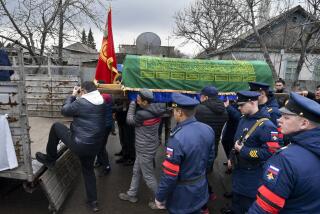ETHNIC DISCORD : For Turkish Kurds, Prospects of a Bloody Summer
- Share via
KIFR DELI, Turkey — The Kurdish farm boy pointed out the feeding trough he had hidden in while the killers scoured his family’s dark, windowless stable with flashlights. They first found and fatally shot his aunt, then they murdered four of his young cousins and their grandmother.
The muddy stable floor was still soaked with the blood and gore from the killings, part of a wave of death that has swept the Turkish southeast after the collapse of a unilateral cease-fire declared by separatist ethnic Kurdish guerrillas.
“They kept shouting, ‘Where is your father!’ Then they just opened fire,” said the boy, 10, who was in shock after his narrow escape from the apparent rebel attack in this village of 800 at the end of a dirt road near Diyarbakir, the regional capital of Turkey’s Kurdish southeast.
A few hours earlier but a world away in Ankara, the Turkish capital, the ruling True Path Party had just taken the unprecedented step of electing a woman leader, soon to become Turkey’s first female prime minister.
The choice of Tansu Ciller sent a thrill of excitement and hopes of changes for the better through this nation of 60 million people. Even in southeastern Turkey, home to about half of the country’s 12 million Kurds, there is goodwill toward Ciller and an unusual readiness among some Turkish officials to discuss alternatives to try to end almost nine years of Kurdish insurgency that has killed more than 6,100 people.
BACKGROUND: But diplomats say any optimism is misplaced. Ciller uses hard-line rhetoric that “everyone in Turkey is a Turk” and seems sure to delegate the problem to the army and right-wing nationalists around her, analysts say.
Relations between Turkey and the Kurdish rebels broke down anew after the April death of President Turgut Ozal, who defied an old Turkish taboo that denied the very existence of the Kurds, an ethnic group of about 20 million split among Turkey, Iran, Iraq, Syria and the Caucasus region.
An opportunity for peace opened with a unilateral cease-fire announced in March by Abdullah Ocalan, the exiled rebel leader. But it vaporized two months later when a rogue band of Ocalan’s Kurdish Workers Party (PKK) guerrillas killed more than 35 unarmed soldiers. He formally announced a return to “all-out war” in early June.
The Kurds, for their part, accuse the Turks of never taking their cease-fire seriously. Apart from vague statements and a limited amnesty offer, Turkish security forces kept up their actions and killed almost 100 guerrillas during the unilateral truce.
“When someone is burning your houses down, then says he’s decided to stop burning them for a while, that doesn’t mean you accept them as a negotiating partner. These are terrorists and must be cleaned out,” said Unal Erkan, the Turkish official in charge of suppressing the insurgency.
Erkan said in an interview that “great Turkey” will outlast a force he estimated at 4,000 rebels. Saying the current violence was “just the scratches you get when you step on a cat’s tail,” he brushed aside recent daily death tolls of 15 to 30 people; those are among the highest of the revolt.
OUTLOOK: Diplomats foresee a bloody summer. Rebels are reportedly dying by the dozen in the mountains, and pro-Kurdish activists are said to be falling victim to mysterious, death squad-style killings. Guerrillas are again burning schools and killing soldiers, Turkish teachers, mosque clergymen and relatives of pro-government Kurdish militiamen.
Stuck in the middle are villagers of such spots as Kifr Deli. Its Kurdish name officially goes unrecognized; its mayor was beaten until he agreed to form a pro-government militia, and now, six more of its women and children have died for naught in an apparent rebel attack.
“If we say we are Kurds, we die. If we say we are Turks, we die. What are we to do? Will they found (a Kurdish state) by killing babies?” asked one villager, listening to the laments of a neighbor who wailed amid the smoking rubble of a burned-out house.
More to Read
Sign up for Essential California
The most important California stories and recommendations in your inbox every morning.
You may occasionally receive promotional content from the Los Angeles Times.










